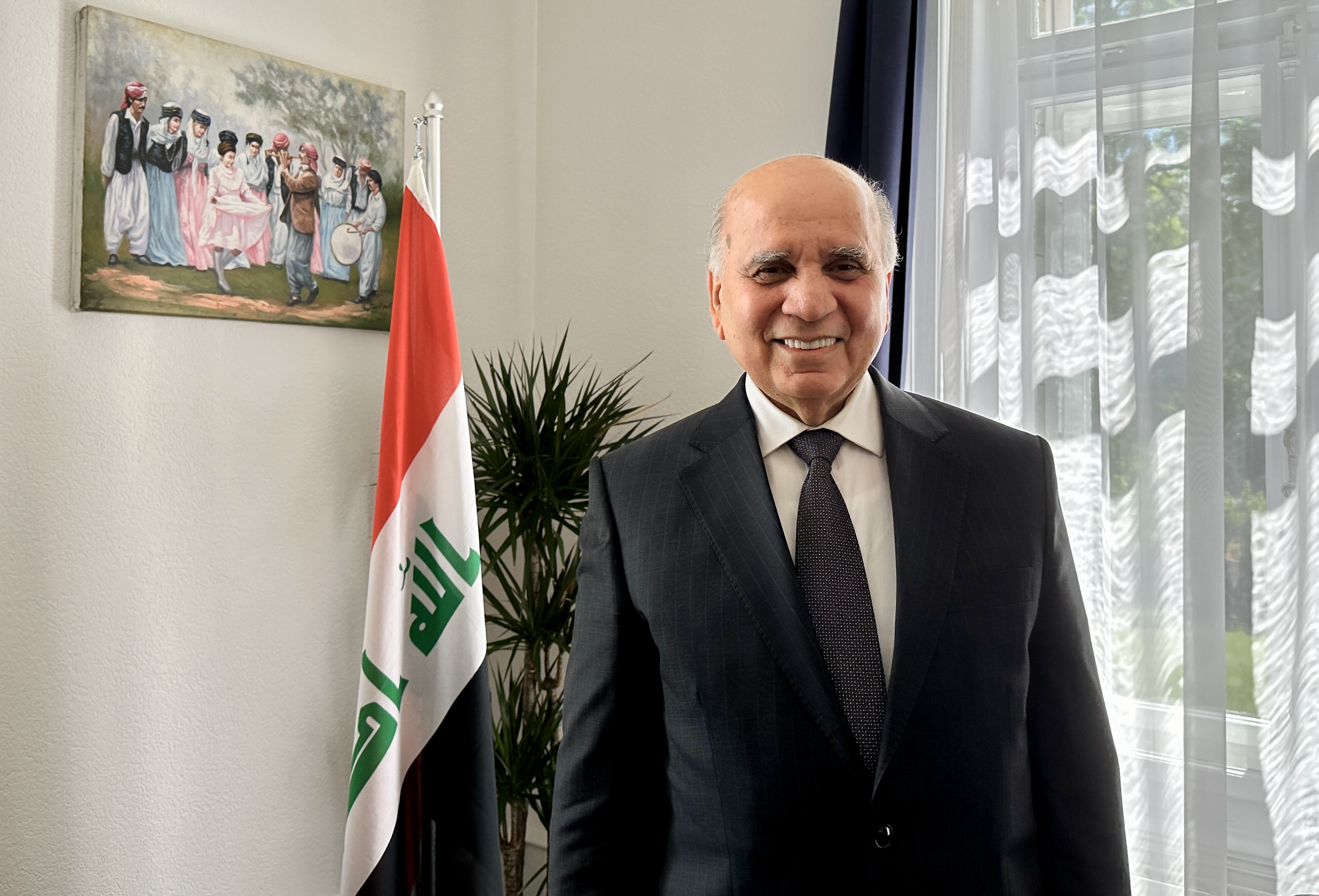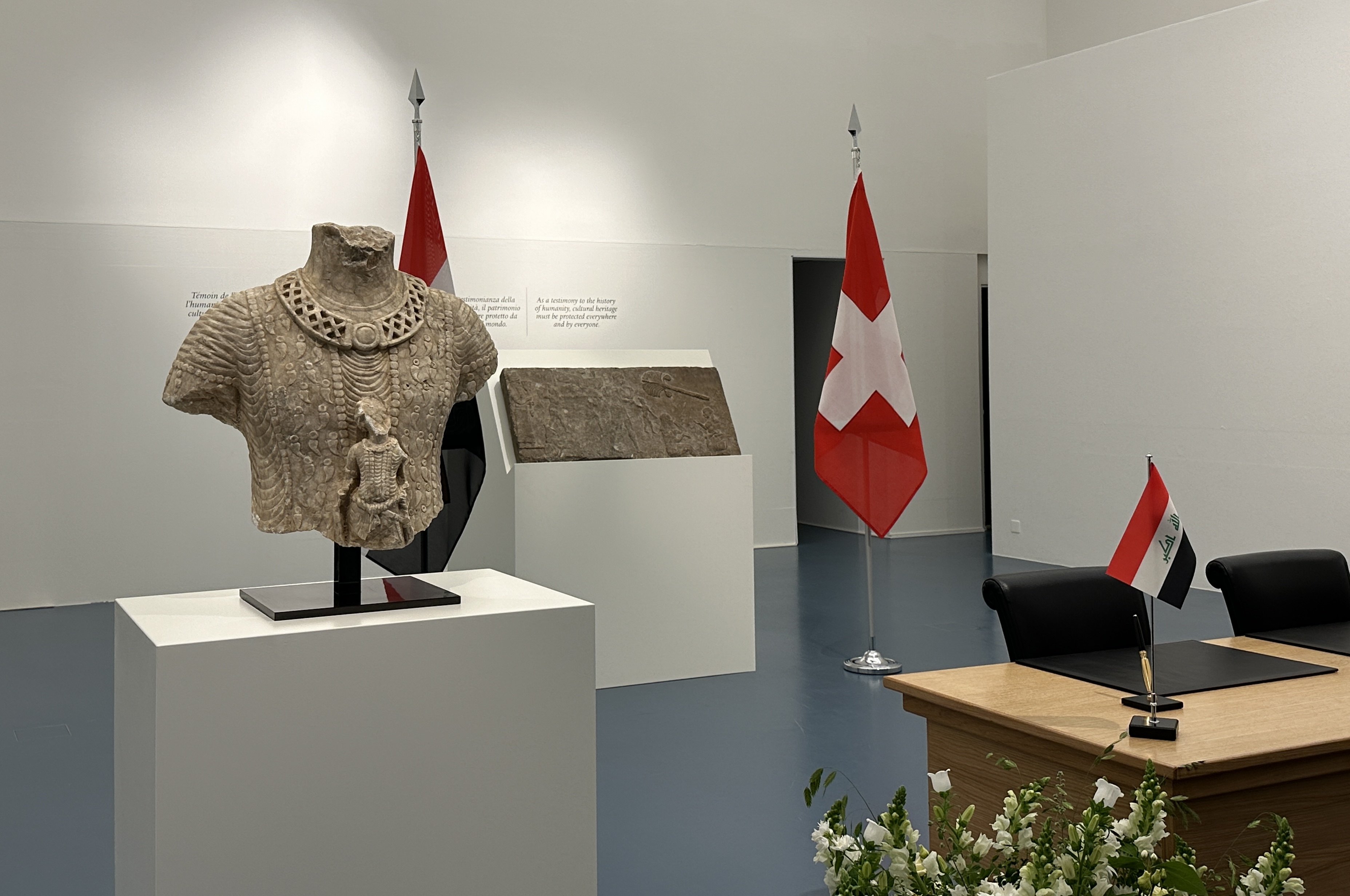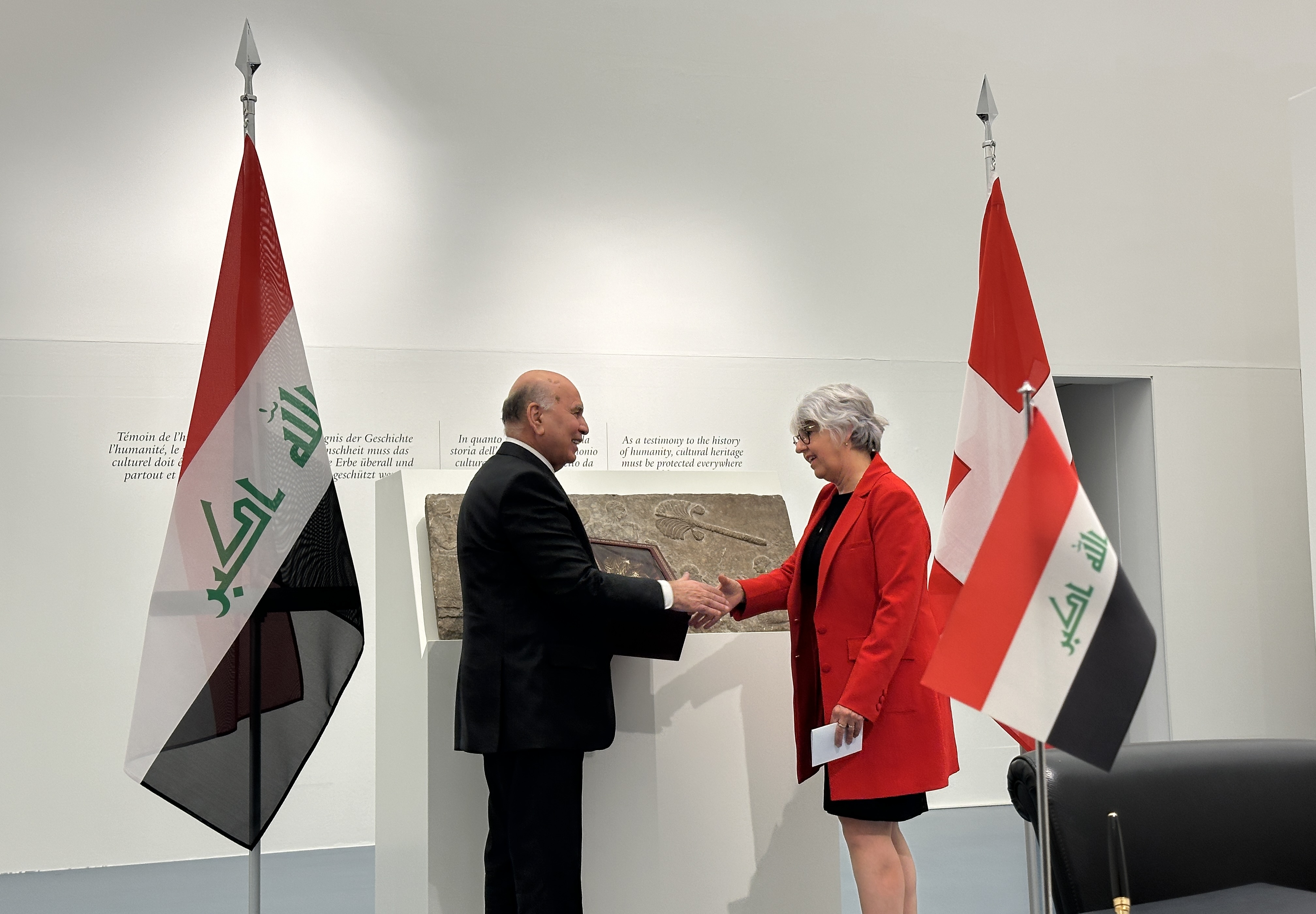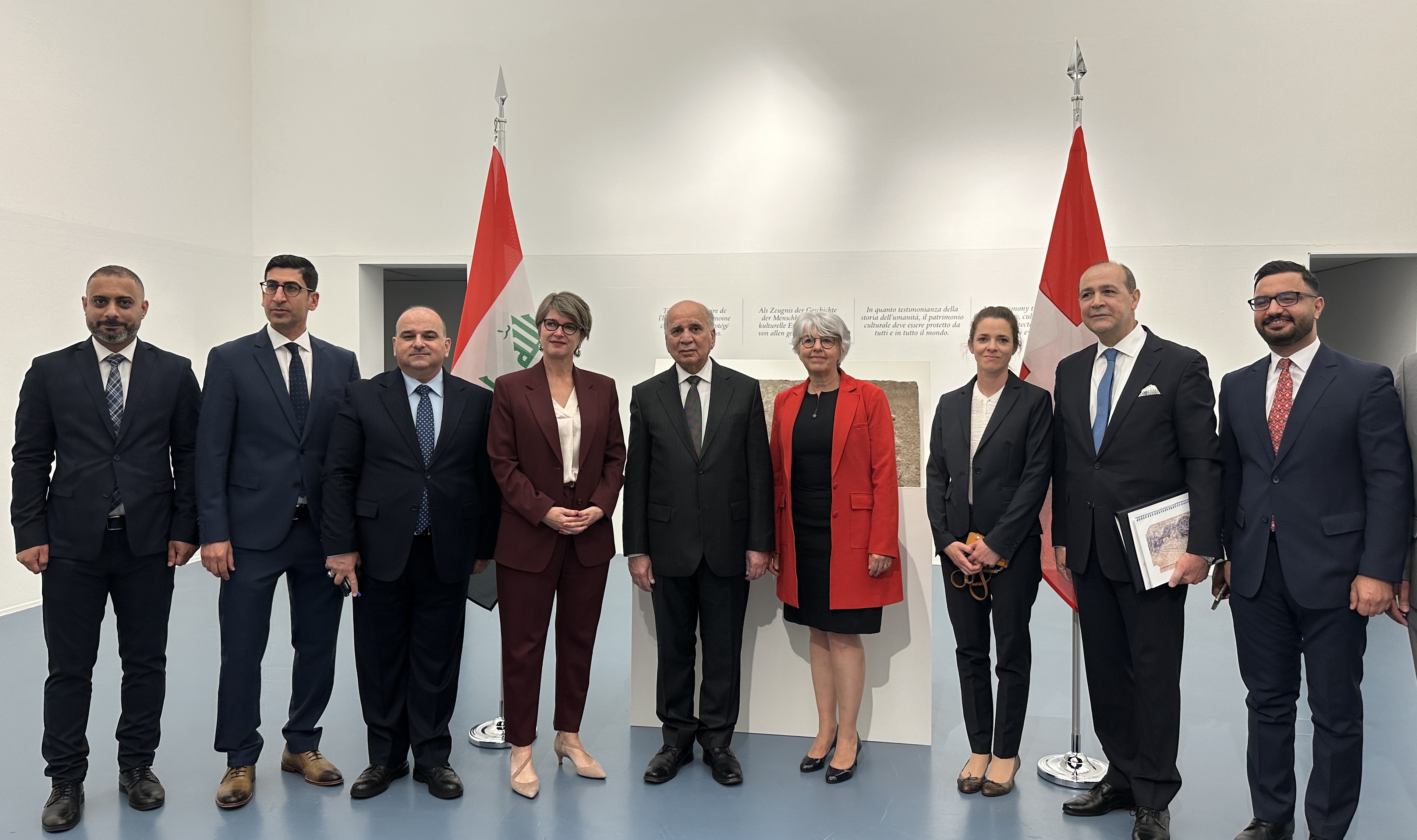
Iraqi Foreign Minister: ‘Switzerland to reopen embassy in Baghdad within months’

In an exclusive interview with SWI swissinfo.ch, Iraqi Foreign Minister Fuad Hussein announced that Switzerland will reopen its embassy in Baghdad within months, ending decades of closure.
On Friday, three significant Mesopotamian cultural artifacts illegally imported to Switzerland were officially returned to Iraq during a ceremony at the Federal Office for Culture in Bern. Swiss Interior Minister Elisabeth Baume-Schneider presented the two reliefs and the statue to Iraqi Deputy Prime Minister and Foreign Minister Fuad Hussein.
The three-day visit also included a meeting with Beat Jans, Switzerland’s minister of justice and police.
SWI swissinfo.ch spoke to Hussein, on the successful recovery of looted artifacts, the reopening of the Swiss embassy in Baghdad, and broader areas of cooperation such as economic development, migration, and cultural exchange.
SWI swissinfo.ch: Iraq has successfully recovered numerous stolen artifacts from various countries, including Switzerland. Could you provide more details on the recent return of the Assyrian artifacts?
Fuad Hussein: At the Iraqi ministry of foreign affairs, we have adopted a policy we call the diplomacy of restitution, which focuses on recovering looted artifacts from Iraq alongside our general foreign policy. Iraqi artifacts were looted after the sanctions on Iraq in 1991. After 2003, hundreds of pieces were stolen and sold in global markets. However, the most extensive campaign of artifact theft was carried out by the Islamic State terrorist organisation (also known as ISIS). After seizing control of various locations, including the Nineveh Governorate, located in the northwestern part of Iraq, they looted thousands of artifacts and sold them, particularly in markets in Western countries.
With our new policy, we have recovered thousands of artifacts. In just one campaign in the United States, we retrieved 17,000 items, and the process is ongoing. In relation to Switzerland, the three artifacts that were recovered today are worth millions of dollars, in addition to their historical and cultural significance. We are focused on reclaiming artifacts that symbolize Iraqi civilization, particularly that of Mesopotamia. Today marked a significant milestone in this endeavor.

SWI: Switzerland is considered one of the main transit countries for stolen artifacts, including from Iraq. How do you evaluate its role in recovering them?
F.H.: Switzerland played a positive role, and we appreciate the federal government’s support. We are also working on retrieving other items from here: twenty coins from the Abbassi period and two pieces from pre-Christian.
The first artifact restituted to Iraq is a partial statue dating back 1,700 to 2,800 years, discovered during official excavations in Iraq and subsequently removed from the country at an unknown date.
The second set of artifacts comprises two large Assyrian reliefs from the 8th century BC, which were discovered at the prominent archaeological site of Nimrud/ Kalhu.
Lastly, Switzerland restituted a fragment of a royal bust. The bust is wearing a pleated tunic and a royal mantle adorned with pendants. It originates from the ancient city of Hatra, dating back to the second to third centuries AD.
The three artifacts were confiscated during a criminal procedure in Geneva canton last year. The primary defendant in the case received a prison sentence for document forgery and for violating the Cultural Property Transfer Act, which prohibits the transfer of stolen or looted cultural goods.
SWI: In 2021, Switzerland made its first official visit to Iraq in over 40 years. During this visit, discussions were held about the potential reopening of a Swiss embassy in Iraq. What are the prospects and potential impacts of reestablishing a full diplomatic mission in Baghdad?
F.H.: I have had multiple meetings with Swiss officials, including at the World Economic Forum in Davos in 2021, 2022, and 2023, as well as other European conferences. The visit of the Swiss Foreign Minister to Baghdad helped convince the Swiss side to reopen a Swiss embassy in the Iraqi capital. We are pleased with this important step and look forward to its official opening and the development of our bilateral relations.
SWI: Has a date been set for the official opening?
F.H.: It is expected that the embassy will reopen in September, just months away.

SWI: Apart from the recovery of artifacts, what are your current priorities in bilateral relations?
F.H.: My visit aims to develop bilateral relations. In addition to the official handover of looted artifacts, several issues are on my agenda, including migration, Iraqi funds smuggled from Iraq and withheld by the Swiss authorities. Our main priorities are economic. Swiss companies can play a crucial role in rebuilding the Iraqi economy, particularly in the pharmaceutical sector. We have conducted meetings with Novartis and other parties regarding this issue.
SWI: Switzerland’s Middle East and North Africa strategy prioritizes peace, security, and human rights. Could you provide insights into current collaborative efforts between Iraq and Switzerland in these areas and any planned future initiatives?
F.H.: There are Swiss NGOs active in Iraq in different fields. We are also monitoring Swiss policies concerning significant Middle Eastern matters. In my meeting with the representative of the foreign ministry, head of the Middle East and North Africa department Maya Tissafi, we discussed these issues, particularly Gaza and the Palestinian cause. We anticipate a more proactive approach from Switzerland on this matter.
Switzerland is a significant country, not just economically, but also in its ability to bring conflicting parties to the negotiating table. Switzerland and Iraq have federal political systems, and we are eager to gain insights from Switzerland’s experience in this area.

SWI: You mentioned the issue of migration. How is Iraq working with Switzerland regarding this issue?
F.H.: During my meeting with the minister of justice and police, we discussed the situation of a small group of Iraqis in Switzerland who are living there without a residence permit. We talked about giving the possibility to those who wish to return to Iraq voluntarily, with Switzerland offering to provide financial support and assistance for their return. We are prepared to cooperate and work together on this matter.
SWI: Are we discussing repatriation or voluntary returns coordinated, for example, with the International Organization for Migration?
F.H.: It’s basically coordination between the two governments, reflected in the joint declaration of intent between the Republic of Iraq and the Swiss Confederation on cooperation in the field of migration we have previously signed.
SWI: Swiss Government Excellence Scholarships are open to Iraqi researchers and artists. How significant is this program for Iraq’s educational and cultural development, and what more can be done to enhance academic and cultural exchange between the two countries?
F.H.: We have discussed this matter with the Swiss Interior Minister Baume-Schneider. We aim to go beyond just providing scholarships and grants to Iraqi students. We have also extended an invitation to experts in artifacts from Switzerland to come to Iraq and contribute their expertise to the reconstruction of archaeological sites. There are ongoing discussions about the tools and mechanisms needed to facilitate this cultural cooperation between the two countries.
SWI: A year ago, the Iraqi embassy in Bern was targeted by unknown assailants. Can you provide an update on the progress of the investigations?
F.H.: We regret that attack and were concerned about the embassy staff, but fortunately, there were no casualties. The Swiss authorities have initiated an investigation, but we have not yet been informed of the results. We hope the authorities will share the results of the investigation with us soon.
Edited by Virginie Mangin/ds

In compliance with the JTI standards
More: SWI swissinfo.ch certified by the Journalism Trust Initiative































You can find an overview of ongoing debates with our journalists here . Please join us!
If you want to start a conversation about a topic raised in this article or want to report factual errors, email us at english@swissinfo.ch.